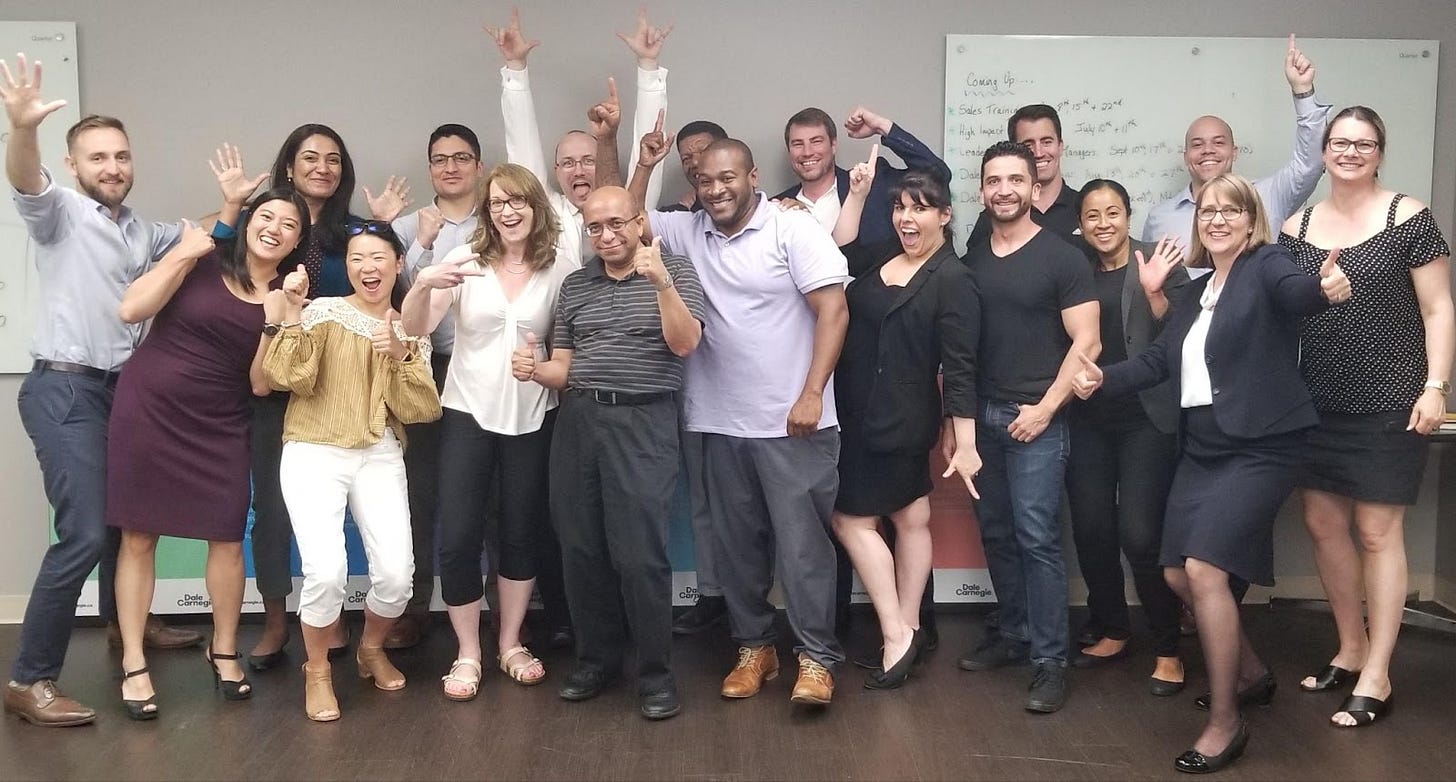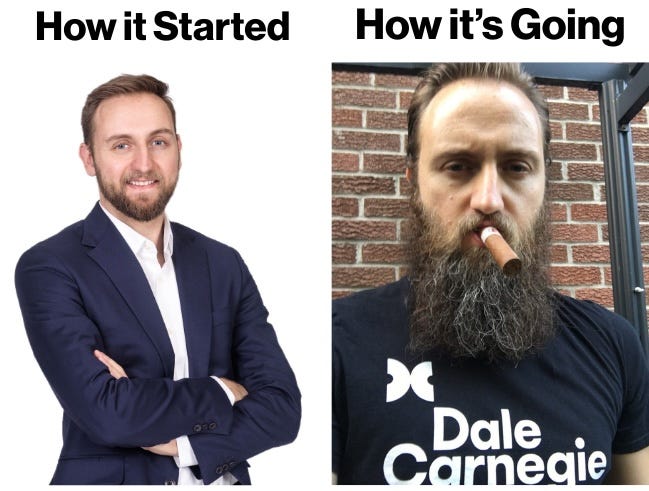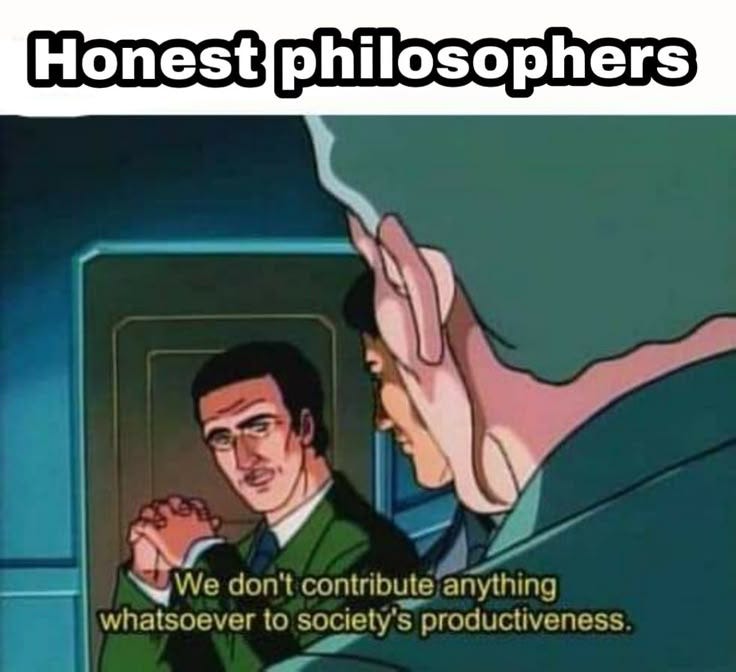How To Win Friends and Get Things Done ... With Wisdom?
This entry is part of a series on “Wise Agency”: Part 1. How To Win Friends and Get Things Done ... With Wisdom? Part 2. High Agency to Wise Agency.
One of my friends likes to call me “jazzy” because of my eclectic intellectual interests. I like the description. This Substack is pretty jazzy: sexbots, sociopaths, scenemaking, entities, goofies, etc.
I see Less Foolish as a mix of practical philosophy and cultural sensemaking: the former helps me navigate life wisely (or at least less foolishly), and the latter helps me understand what’s happening in the wider world, supporting that same navigation.
While it may all seem random, it helps me make practical sense of things, and making sense in practice is a lot like listening to good jazz.
I’m also pretty jazzy with how I make money. I’m currently what you’d call a “solopreneur,” supporting my livelihood through things like writing here, stewarding The Stoa, offering philosophical counselling, doing gigs at startups, teaching “inverse courses,” and selling ritualized “Stoic” coffee.
It used to come with a tinge of financial anxiety due to the fluctuating month-to-month cash flow, but now it’s just fun—and it allows me to stay in integrity, which is something people and platforms are always trying to pull you out of. I’m optimistic that if I keep persisting, my livelihood activities will cohere more, and my integrity, once rocklike, will inspire financial abundance.
I’m also pretty normal day to day. Some might even say I live like a “normie” because I believe there’s wisdom in following good norms. My former job was pretty normal, and I do miss it, because it allowed me to hang around people with normal jobs and teach them normal things, like how to win friends and influence people.
I was a trainer at Dale Carnegie Training, teaching the famous Dale Carnegie Course, first taught in 1912 by Dale Carnegie himself, which eventually led to one of the best-selling self-help books of all time, How to Win Friends and Influence People.
The course is like exposure therapy for people in the corporate world to overcome their public speaking and leadership anxiety.
My Dale Carnegie career ended when COVID started. While I was still technically a trainer, there was no training to do, since they didn’t have a robust online program.
COVID led me to The Stoa. The Stoa led me to "go crazy." And that led me here, solopreneuring in front of you.
Before Carnegie, I worked as a Project Analyst at the University of Toronto. The project management space is all about being agentic, as the kids in Silicon Valley like to say—understanding systems and creating new ones to get things done.
My favourite system among all the systems is Getting Things Done (GTD), created by David Allen. I loved this system. I loved it so much, I even purchased a poster of it for my office.
Basically, GTD is a method that helps organize one’s tasks, involving five steps: capture, clarify, organize, reflect, and engage. The art of GTD aims to clean up mental clutter, reduce anxiety and overwhelm, and promote greater focus.
David Allen visited The Stoa twice before (here and here). During those sessions, it became clear to me that his work has a spiritual side, and that GTD serves as a martial art for information flows—organizing them into actionable ones and others to store for later—allowing one to remain conscious of what matters most.
I mentioned GTD in a previous entry, which prompted Edward Lamont to reach out to me. Edward is David Allen’s co-author for their new book, Team: Getting Things Done with Others. We jumped on a call, sensing into something we could do together. I thought it would be cool to bring David back to The Stoa, but I’m not doing many one-off online events these days, especially not business-friendly ones.
Shortly after our call, I had lunch with my former boss at Dale Carnegie Training, the thumotic Kevin Crone. Given they are launching new offerings, I suggested a “Carnegie Stoa”—a conversation series where we bring in business authors to speak with local Toronto leaders, starting with David and Edward. He liked the idea, and now, for the first time, I get to bring together the magic of Carnegie and GTD.
I do criticize self-help material (a lot), but some of it is good. You just have to have a high signal radar for what that is. There’s a reason why How to Win Friends and Influence People and Getting Things Done are so popular: they help with one’s agency. The former shows how to be socially effective in professional contexts; the latter, how to get things done within them.
I’m bullish on both Carnegie and GTD. If you don’t have basic social skills and some kind of system that resembles GTD, you’re not in the game. Meaning, you’re not accomplishing the things that are wise for you to do. However, agency without wisdom is not the answer either.
Techbros today often talk about the importance of IQ and “high agency” as if they were magical elixirs. The tweet below from Paul Graham captures the present ethos of the techbros perfectly...
If only one could 10x their agency—just imagine the wonders they could accomplish!
Yes, agency can be good, and 10x agency can be great, but wisdom—and wise agency—are far more critical.
Wise Agency
Highly intelligent people with high agency can win many “friends” and get a lot of things done, but they might be doing so foolishly.
Some recent examples of agentic fools include Elizabeth Holmes (Theranos), Adam Neumann (WeWork), and Billy McFarland (Fyre Festival). These individuals had high agency, but their foolishness led to their downfall and the suffering of others.
The kind of agency that comes from knowing how to win friends and get things done is important and should be learned. But without aligning it with wisdom—and without fellow travelers on the path toward less foolishness—greater foolishness often follows.
The following Alan Kay quote captures the premise of wise agency: “Perspective is worth 80 IQ points.” High intelligence allows one to manipulate abstract information quickly, and high agency allows one to accomplish complex objectives efficiently. However, one can be manipulating and accomplishing with the wrong information and toward the wrong goal.
According to Igor Grossmann1, a Toronto-based psychologist and wisdom researcher, perspective-taking is necessary for wisdom. At the heart of wisdom is what he calls “perspectival meta-cognition,” which includes the ability to consider multiple viewpoints. This can be dangerous to agency maximizers, as it risks disrupting the clarity that a singular objective provides.
Philosophers, the supposed lovers of wisdom, have a reputation for being useless among the agentic ones, such as those in the business world, and for good reason. Some really do contribute nothing besides sounding smart and being theoretically impotent, endlessly prattling on about what dead philosophers really meant to say.
The same can be said of modern wisdom lovers, or those considered to have “high consciousness.” This trait is often treated as synonymous with wisdom and has become a kind of catchall, typically referring to a greater capacity for complexity: perspectival meta-cognition, non-ordinary states of consciousness (whether embodied or mindfully induced), and higher developmental stages (Kegan 5, baby!).
Those with high consciousness may be going through a Kundalini awakening every other week, ayahuasca-maxxing in between, we-spacing on Zoom, and constantly polishing their metamodern theories. However, the criticism of this group is that they, like the “philosophers” before them, often lack the agency to win friends and get things done in ways that lead to real change in the world.
Agentic Sages
from is one of the more interesting people active in the wider wisdom space (sometimes called the “Wisdom Commons,” or, as he puts it, the “World Wise Web”). These wisdom spaces are oriented toward wisdom and tend to attract so-called “high consciousness” people.In a recent article, Tom softly criticized a certain cohort in these spaces—those who may have cultivated high consciousness but lack high agency. His project, by contrast, is to take high-agency people and imbue them with high consciousness. I like this framing, and a 2x2 emerges from it, with high and low consciousness on one axis and high and low agency on the other:
Spiritual Bypassers – High consciousness, low agency
Agentic Fools – High agency, low consciousness
Agentic Sages – High agency, high consciousness
NPCs – Low agency, low consciousness
Jailbreaking NPCs might be too difficult a project to start with. Hence, imbuing agentic fools with greater consciousness—Tom’s project—and spiritual bypassers with greater agency seem to be the two wise approaches. In any case, those with wise agency—the “agentic sages”—are the north star for both groups.
I assess myself as having mid-level consciousness and agency—perhaps a bit higher on good days, or lower on bad ones. As such, I relate to the challenges of both groups. Agentic fools, who overindex on a masculine ethos, need to slow down in ways that allow them to keep moving. Meanwhile, spiritual bypassers, who overindex on a feminine ethos, need to speed up in ways that allow them to remain still—spiritually still, that is.
Since Tom is focused on the already agentic, I’ll put my focus on the already conscious and write directly to them.
Dear Bypassers
Firstly, you are already conscious enough, probably more so than the vast majority of the population. Yes, there are levels to this, and you can always increase your consciousness, and therefore your wisdom. But now is the time to get your shit together, and you know it. Start slow, but in ways that build momentum, so you can eventually go fast.
I recommend starting with two simple, existential projects mentioned at the beginning of this article:
Winning Friends
Getting Things Done
To win friends, you need to push through any social anxiety you may have by putting yourself in situations that are challenging, ones you can overcome. It means having basic relational skills, like disagreeing with someone in good faith. It also requires cultivating a power literacy, so you can sense sociopaths in the social fields you find yourself in and be wise as serpents in dealing with them.
To get things done, you need a schedule that allows you to weave between different modes, ones where you can simply be, and others where you strive to have. It means developing basic discipline and slowly installing effective habits into your life. It also requires cultivating a work literacy: knowing when and how to work well, and having the discernment to push through or let go when challenges arise.
Again, without these fundamental agentic skills, you won’t be in the game. These skills can be used foolishly, or even for evil, but the same can be said of not cultivating them. It’s a risk you have to take to do the good in the world your heart longs to bring forth.
Yes, the existing systems where “agentic fools” unconsciously accomplish things can corrupt the soul. But you’ll be playing consciously, which means doing things a little differently, sometimes following the rules and best practices, and sometimes breaking them.
Personally, I feel called to exercise my agency more these days. That means winning friends and getting things done within systems that have the potential to corrupt us. The less foolish disposition, I sense, is treating this venture as a form of wisdom cultivation: one that includes advanced spiritual practices like journaling here in front of you.
See Igor’s session @ The Stoa here:








